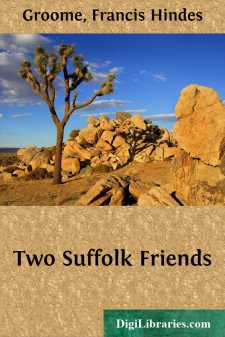Categories
- Antiques & Collectibles 13
- Architecture 36
- Art 48
- Bibles 22
- Biography & Autobiography 813
- Body, Mind & Spirit 142
- Business & Economics 28
- Children's Books 17
- Children's Fiction 14
- Computers 4
- Cooking 94
- Crafts & Hobbies 4
- Drama 346
- Education 46
- Family & Relationships 57
- Fiction 11829
- Games 19
- Gardening 17
- Health & Fitness 34
- History 1377
- House & Home 1
- Humor 147
- Juvenile Fiction 1873
- Juvenile Nonfiction 202
- Language Arts & Disciplines 88
- Law 16
- Literary Collections 686
- Literary Criticism 179
- Mathematics 13
- Medical 41
- Music 40
- Nature 179
- Non-Classifiable 1768
- Performing Arts 7
- Periodicals 1453
- Philosophy 64
- Photography 2
- Poetry 896
- Political Science 203
- Psychology 42
- Reference 154
- Religion 513
- Science 126
- Self-Help 84
- Social Science 81
- Sports & Recreation 34
- Study Aids 3
- Technology & Engineering 59
- Transportation 23
- Travel 463
- True Crime 29
Two Suffolk Friends
Categories:
Description:
Excerpt
A SUFFOLK PARSON.
The chief aim of this essay is to present to a larger public than the readers of a country newspaper my father’s Suffolk stories; but those stories may well be prefaced by a sketch of my father’s life. Such a sketch I wrote shortly after his death, for the great ‘Dictionary of National Biography.’ It runs thus:—
“Robert Hindes Groome, Archdeacon of Suffolk, was born at Framlingham in 1810. Of Aldeburgh ancestry, he was the second son of the Rev. John Hindes Groome, ex-fellow of Pembroke College, Cambridge, and rector for twenty-six years of Earl Soham and Monk Soham in Suffolk. From Norwich school he passed to Caius College, Cambridge, where he graduated B.A. in 1832, M.A. in 1836. In 1833 he was ordained to the Suffolk curacy of Tannington-with-Brandish; in 1835 travelled through Germany as tutor to Rafael Mendizabal, the son of the Spanish ambassador; in 1839 became curate of Corfe Castle, Dorsetshire; and in 1845 succeeded his father as rector of Monk Soham. Here in the course of forty-four years he built the rectory-house and school, restored the fine old church, erected an organ, and re-hung the bells. He was Archdeacon of Suffolk from 1869 till 1887, when failing eyesight forced him to resign, and when the clergy of the diocese presented him with his portrait. He died at Monk Soham, 19th March 1889. Archdeacon Groome was a man of wide culture—a man, too, of many friends. Chief among these were Edward FitzGerald, William Bodham Donne, Dr Thompson of Trinity, and Henry Bradshaw, the Cambridge librarian, who said of him, ‘I never see Groome but what I learn something new.’ He read much, but published little—a couple of charges, a sermon and lecture or two, some hymns and hymn-tunes, and a good many articles in the ‘Christian Advocate and Review,’ of which he was editor from 1861 to 1866. His best productions are his Suffolk stories: for humour and tenderness these come near to ‘Rab and his Friends.’”
An uneventful life, like that of most country clergymen. But as Gainsborough and Constable took their subjects from level East Anglia, as Gilbert White’s Selborne has little to distinguish it above other parishes in Hampshire, so I believe that the story of that quiet life might, if rightly told, possess no common charm. I have listened to my father’s talks with Edward FitzGerald, with William Bodham Donne, and with two or three others of his oldest friends; such talks were like chapters out of George Eliot’s novels. His memory was marvellous. It seems but the other day I told him I had been writing about Clarendon; and “Clarendon,” he said, “was born, I know, in 1608, but I forget the name of the Wiltshire parish his birthplace. Look it up.” I looked it up, and the date was 1608; the parish (Dinton) was, sure enough, in Wiltshire. Myself I have had again to consult an encyclopædia for both date and place-name, but he remembered the one distinctly and the other vaguely after possibly thirty years. In the same way he could recall the whole plot of a play which he had not seen for half a century. Holcroft’s ‘Road to Ruin,’ thus, was one that he once described to me. He was a master of the art, now wellnigh lost, of “capping verses”; and he had a rare knowledge of the less-known Elizabethan dramatists. In his first Charge occurs a quotation from an “old play”; and one of his hearers, Canon “Grundy,” inquired what play it might be. “Ford’s,” said my father, “‘’Tis pity she’s no better than she should be.’” And the good man was perfectly satisfied. But stronger than his love of Wordsworth and music, of the classics and foreign theology, was his love of Suffolk—its lore, its dialect, its people. As a young man he had driven through it with Mr D. E. Davy, the antiquary; and as archdeacon he visited and revisited its three hundred churches in the Norwich diocese during close on a score of years. I drove with him twice on his rounds, and there was not a place that did not evoke some memory. If he could himself have written those memories down! He did make the attempt, but too late. This was all the result:—
“Oct....


